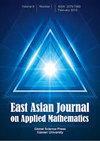从拆分方案再衍生出的多元反馈粒子滤波器
IF 1.1
4区 数学
Q2 MATHEMATICS, APPLIED
引用次数: 0
摘要
多变量反馈粒子滤波器(FPF)是从拆分方法的角度提出的。这种表述与正式推导的本质区别在于,我们将更新阶段视为每个时间间隔内粒子的随机流,而不是离散时间瞬间的一次性控制。这样,通过比较粒子的柯尔莫哥洛夫前向充量和库什纳方程的更新部分,我们就能很容易地得到一致的随机流。此外,如果存在最优随机流,则可以通过传递到连续时间的 FPF 来研究分裂上升法的收敛性。为了保证随机流的存在,我们在非线性滤波系统和初始状态的温和条件下,在给定时间离散化和观测路径的情况下,验证了交替分布的泊恩卡不等式。此外,通过重新检验 FPF 的原始衍生,我们证明了在抽象贝叶斯推理框架中,先验值与后验值之间的最优传输映射是一个 $f$ 发散不变式。本文章由计算机程序翻译,如有差异,请以英文原文为准。
Multivariate Feedback Particle Filter Rederived from the Splitting-Up Scheme
The multivariate feedback particle filter (FPF) is formulated from the viewpoint of splitting-up methods. The essential difference between this formulation and
the formal derivation is that instead of one-time control at a discrete time instant, we
consider the updating stage as a stochastic flow of particles in each time interval. This allows to easily obtain a consistent stochastic flow by comparing the Kolmogorov forward
equation of particles and the updating part of the Kushner’s equation in the splitting-up
method. Moreover, if an optimal stochastic flow exists, the convergence of the splitting-up method can be studied by passing to an FPF with a continuous time. To guarantee the
existence of a stochastic flow, we validate the Poincaré inequality for the alternating distributions, given the time discretization and the observation path, under mild conditions
on the nonlinear filtering system and the initial state. Besides, re-examining the original
derivation of the FPF, we show that the optimal transport map between the prior and
the posterior is an $f$-divergence invariant in the abstract Bayesian inference framework.
求助全文
通过发布文献求助,成功后即可免费获取论文全文。
去求助
来源期刊

East Asian Journal on Applied Mathematics
MATHEMATICS, APPLIED-
CiteScore
2.60
自引率
8.30%
发文量
48
期刊介绍:
The East Asian Journal on Applied Mathematics (EAJAM) aims at promoting study and research in Applied Mathematics in East Asia. It is the editorial policy of EAJAM to accept refereed papers in all active areas of Applied Mathematics and related Mathematical Sciences. Novel applications of Mathematics in real situations are especially welcome. Substantial survey papers on topics of exceptional interest will also be published occasionally.
 求助内容:
求助内容: 应助结果提醒方式:
应助结果提醒方式:


